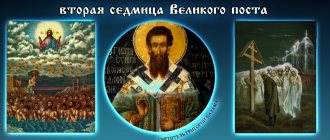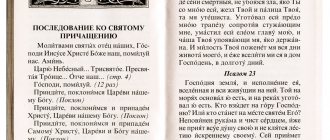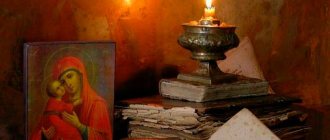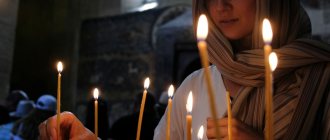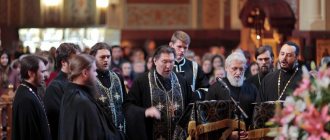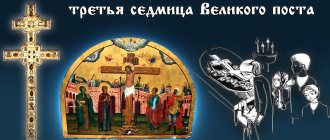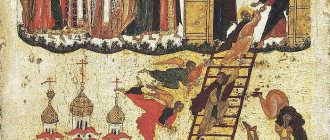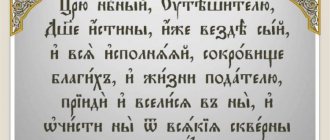Questions about restrictions on intimate communication between spouses during periods of four multi-day fasts and certain days of the week during the calendar year are very often raised by family people in confession. In our age of temptation, the relevance of this topic cannot be underestimated, if only because the family path, unlike monasticism, is chosen by the vast majority of people. Considering the sensitivity of this topic, many Christians are embarrassed to ask a priest about marital relationships in person and are forced to do this in absentia, directing their questions to our website under the section on intimate relationships.
A. V. Prostev. What God has joined together, let no man separate. 2008
However, to this day there is no clear answer to this question, and each confessor decides it based on his experience and understanding. Basically, we observe a tendency to punish “intemperate spouses” with penances and excommunication from the Sacrament of Communion. After all, in the Old Believer Church, the strictest of all existing statutes were adopted. This applies to food, confessional and other rules regulating various spheres of the spiritual, family and social life of the Old Believer. By the way, in Ukraine and Moldova, in many communities of the Russian Orthodox Church there is a strange and long-established tradition: family people practically do not partake of the Holy Mysteries, and there is an unspoken belief that only infants, unmarried people and widows are allowed to take communion.
We decided to look into this difficult but important issue for family people.
Holy Scripture on the issue of marital relations
The Apostle Paul writes:
Let the husband render due love to his wife, and so should the wife to her husband. The wife does not own her body, but the husband does. Likewise, the husband does not own his body, but the wife does. Do not deprive yourself of each other, only by agreement in time. May you continue in fasting and prayer, and gather together again, so that Satan does not tempt you with your intemperance (1 Cor. 7:3-5).
One of the greatest preachers of abstinence and repentance in the entire history of the Church, Saint John Chrysostom , interprets these words this way:
“A wife should not abstain against the will of her husband and a husband should not abstain against the will of his wife. Why? Because great evil comes from such abstinence; This often resulted in adultery, fornication and domestic disorder. After all, if others, having their own wives, indulge in adultery, then they will indulge in it all the more when they are deprived of this consolation. The Apostle said well: do not deprive yourself; what I called deprivation here, I called above duty, to show how great their mutual dependence is: to abstain for one against the will of the other means to deprive, but by will - not. Thus, if you take something from me with my consent, it will not be a deprivation for me; he who takes against his will and by force deprives. Many wives do this, committing a great sin against justice, and thereby giving their husbands a reason for debauchery, and leading everything into disorder. Unanimity should be preferred over everything: it is most important. What is the use of fasting and abstinence when love is violated? No".
The Church also has the 13th rule of St. Timothy of Alexandria:
“Question 13: for those who copulate in the communion of marriage, on which days of the week should they observe abstinence from copulation with each other, and on which days should they have the right to do so? Answer: before I said, and now I say, the apostle says: do not deprive yourself of each other, only by agreement, for the time being, but remain in prayer: and gather together again, so that Satan does not tempt you with your intemperance. However, it is necessary to abstain on the Sabbath and Sunday, because on these days a spiritual sacrifice is offered to the Lord.” ( Slavic helmsman. Rule 13. To those who live together with husbands and their lawful wives, says the apostle, do not deprive yourself of each other, only if you want, do it in consultation: let not Satan tempt you. It is necessary on Saturday and week, so that they do not draw near to oneself, since in these days spiritual sacrifice is offered to God).
Rule 3 of Saint Dionysius of Alexandria states:
“Those who marry must be their own judges. For they heard Paul writing that it is proper to abstain from one another by consent until a time comes, in order to practice prayer, and then to be rich again” (1 Cor. 7:5). ( Slavic helmsman. Having legally copulated with a husband and wife by consultation, let them not touch each other for a while, and let them practice prayer, and again, let them remain together).
St. Basil the Great, in his first conversation (On Fasting 1), writes: “Fasting also knows the measure in marital affairs, restraining from immoderation in what is permitted by law; by agreement, he sets aside time for them to remain in prayer.”
If you look at the history of the Ecumenical and Local Councils of the first millennium, then in those days a one-day marital fast was prescribed before Communion . However, over time, the rules became stricter, calling on spouses to refuse intimate relationships for more than half a year.
If we take the strictest regulations regarding the restriction of four annual multi-day fasts, Wednesdays, Fridays, Sundays, as well as great holidays, then only about 90 days a year remain for marital intimacy.
Moreover, these days women may have menstruation, various ailments, and not only the wife, but also the husband; busyness with work and housework, ordinary fatigue or lack of proper mood. Therefore, for many family people, these conditions are objectively absolutely unbearable , that is, according to the word of Christ, “heavy and unbearable burdens” are placed on them (Matthew 23:4). It should be noted that if the children of the church fully followed the instructions of the nomocanons, then children would be born to them only on certain days and months. But, as we see, children appear all year round, even in November and December, when it is 9 months since last year’s Lent. This means that, despite the severity of the “rules,” not everyone follows them.
The superstitious idea that children conceived during Lent allegedly bear some kind of curse was clearly disputed by the saints in the Old Russian Church. In the 12th century, such Russian confessors as the Novgorod Kirik already had at their disposal “thin nomokanuntsy” - books that, in the words of Archbishop Nifont , “are fit to be burned.” “I read to him from a certain commandment: if a man lies on the week, or on Saturday, or on the heel, and a child is conceived, then he will be a thief, a fornicator, a thief, or a trembler, and the parents will do penance for two years, and he will say to me: you books are good for burning” (Questions from Kirik and answers from Bishop Nifont) [1].
It should be noted that the fasts during the life of the Apostle Paul were not as long as they are today. In general, fasting and marital abstinence are two different feats that have certain connections with each other, but are different in essence. Fasting, in terms of limiting the consumption of lean food, is a personal feat: everyone determines for himself how much and what kind of food to eat (even among lean foods there is a wide variety of foods). Not a single rule calls on us to completely abstain from food during fasting days and multi-day fasts, but only indicate to eat food of a different quality, lean, and limit the quantity.
Marital abstinence is a mutual feat. In addition, unlike food, marital communication cannot be replaced with anything else during fasting days. But it is the intimate relationship between spouses that constantly maintains their unity, in particular spiritual and emotional. This relationship is nothing more than the fulfillment of the words of God Himself: “And the two will become one flesh, so that they are no longer two, but one flesh” (Mark 10:8).
Are not rigoristic attitudes about multi-day abstinence contrary to Christ’s teaching about one flesh and the apostolic instruction “not to deprive ourselves of one another, only by consent and for a time”?
Be that as it may, in the Church since ancient times there has been a norm of abstinence from marital cohabitation during fasting. But, unlike food prohibitions, for violation of which the canons are punished by excommunication from St. The sacraments and the instructions of the holy fathers regarding the prohibitions on marital communication during Lent are rather advisory in nature. Naturally, the principle of abstinence during Lent should also apply to this side of life. The extent of abstinence and the frequency of fasting relationships should be decided by the spouses themselves as self-sufficient judges, and the key point is by consent . Ideally, of course, it would be nice to also seek advice and blessing from your spiritual father.
Orthodox Life
About six centuries after Balsamon, another famous Greek canonist and interpreter of the rules, the Monk Nicodemus the Holy Mountain, speaks about the same thing. The name of St. Nicodemus in the Greek Church is more authoritative than in Russia, since he is the author of the “Pidalion” - a set of conciliar and patristic rules of the Orthodox Church with extensive interpretations and numerous notes by St. Nicodemus, which were compiled by him based on the interpretations of Byzantine canonists and the teachings of the holy fathers . Clerics of the Greek Church use the Pidalion as a practical guide.
So, let's turn to the note of St. Nicodemus the Holy Mountain to the 69th canon of the holy apostles (this rule defines: “Whoever is a bishop, or presbyter, or deacon, or subdeacon, or reader or singer, does not fast on the Holy Pentecost before Easter, or on Wednesday, or on Friday, except obstacles due to bodily weakness: let him be expelled. If he is a layman: let him be excommunicated"). St. Nicodemus writes: “If the fast of Wednesday and Friday is equal to the fast of Pentecost, then it is clear that just as weddings are not celebrated on Pentecost, according to the 52nd Rule of the Laodicean Council, so they should not be celebrated on Wednesday and Friday. In this case, it is also clear that it is not appropriate for spouses to enter into a carnal relationship on these days for the sake of holiness and honor of fasting, just as it is not appropriate for spouses to enter into a relationship on Lent. For it is inappropriate, on the one hand, not to break these days of fasting in relation to food, and on the other hand, to break them with carnal union and pleasure. Consequently, on these days one should fast, abstaining equally from foods prohibited during fasting and from carnal lust. So the prophet Joel secretly spoke about the fact that during fasting spouses should be chaste: “Sanctify the fast, preach celibacy... so that the groom may come from his bed and the bride from her palace” (Joel 2:15-16). The Divine Apostle Paul already says directly that spouses by consent must abstain from carnal union in order to remain in fasting and prayer (see: 1 Cor. 7:5), that is, they must abstain, as we said, both during fasting and during the time when they pray and prepare for communion of the Divine Mysteries, as well as on Saturday and Sunday, according to the 13th rule of Timothy of Alexandria, and in general on all holidays, when a spiritual sacrifice is offered to God. See also the 1st note to the 13th Rule of the VI Ecumenical Council and the note to the 3rd rule of Dionysius. See also the 50th answer of Balsamon to Mark, in which he says that spouses who did not abstain on Great Pentecost should not only be prohibited from receiving communion on Easter, but also be assigned penance for correction. Pay attention also to the following statement of John Chrysostom (“The Sermon on Virginity”), citing as evidence the mentioned passage from the prophet Joel: “If newlyweds, whose love passion is at its height, youth is blossoming and lust is uncontrollable, they should not enter into a relationship during fasting and prayers, then all the more other married couples who are not subjected to such violence of the flesh should not unite.”
Let us consider the 1st note to the 13th Rule of the VI Ecumenical Council, to which St. Nicodemus. In this note he says the following: “Note that when the Patriarch Mr. Luke was asked how many days a person intending to receive communion should abstain, he conciliarly declared that not only initiates, but also married laymen should not touch their wives for three days. If the Lord commanded the Jews not to approach their wives for three days, so that the Jews would accept the Old Law: “Be prepared, and for three days you shall not go in among the women” (Exodus 19:15), then how much more appropriate is it to observe these words for those who will face the Divine The Eucharist takes into itself not the law, but God the Lawgiver Himself. Even if the bishop Abimelech (or Abiathar), intending to give the showbread to David and his people, asked them if they were clean from their wives, and they answered that they had abstained from intercourse with their wives for three days - “And David answered the priest and said to him: and We abstained from wives yesterday and the third day” (1 Sam. 21:5), then how is it not appropriate for those who intend to partake of the Lord’s Body to be clean from wives for three days? But those who are going to get married should also confess together with their brides, fast, prepare in advance and get married before the Divine Liturgy. After they are married, let the Divine Liturgy begin, after which let them begin the Communion of the Divine Mysteries. And on the night after Communion they must refrain from intercourse, as this most holy custom and order has been and is observed to this day by true Christians who want to be saved. Therefore, according to Balsamon, the above-mentioned Mr. Luke imposed penance on those newlyweds who copulated on the same day after Holy Communion. Based on this, we deduce from the greater the lesser and say: if three days of abstinence from carnal intercourse is sufficient to prepare for Communion, then three days of fasting is even more sufficient. And although none of the divine rules establishes fasting before communion, those who are able to fast before it for a whole week do well.” Let's see what the Rev. says. Nicodemus, in a note to the 3rd rule of Dionysius of Alexandria, defines this rule: “Those who are married should also be sufficient judges for themselves. For they heard from the writings of the Apostle Paul that they should abstain from each other by consent for a while, in order to practice fasting and prayer, and then be together again, from the writings of the Apostle Paul” (see: 1 Cor. 7:5). To this note, Rev. Nicodemus also sends us away, interpreting the 69th Apostolic Canon: “The following confusion may arise: since the apostle says “pray without ceasing” (1 Thess. 5:17), and those who have entered into marriage must abstain from intercourse during the time of prayer, according to the same apostle Paul and the prescription of this rule, then they must always abstain and never have sexual intercourse? However, this perplexity is most satisfactorily resolved by two canons of Timothy of Alexandria, 5th and 13th, which say that by times of prayer the apostle means liturgical meetings and liturgy. They were performed at that time mainly on Saturdays and Sundays, and on these days abstinence was required from the spouses in order to partake of the Divine Mysteries. This means that this rule of Dionysius makes it clear to any reasonable listener that it directly answers Basilides’ question about whether spouses should abstain from each other when they intend to take communion, because it answers: to this the spouses themselves are sufficient judges for themselves, that is, for them one must abstain during Communion. Although Zonara and Balsamon did not interpret this rule in this sense (I don’t know why), they believed that we are talking about the most diligent prayer, which should be accompanied by suffering and tears. Note also that, as the apostle adds, along with the time of prayer, spouses must also abstain during the fasts established by the Church.”
About the same St. Nicodemus also speaks in his other work, the Exomologitarion. This book is addressed to both confessors and the confessors themselves. In it St. Nicodemus gives the following instructions: “It should also be noted that just as it is appropriate to fast on Wednesdays, Fridays and Lent in relation to food, so it is necessary to observe fasting in relation to carnal pleasures.”
Let us cite the instructions of St. John Chrysostom on abstinence during Great Lent and how to correctly understand the words of the Apostle Paul. In “A Sermon on Virginity” he writes: “...The following also deserves research: if “marriage is honorable and the bed undefiled” (Heb. 13:4), then why does the apostle not allow them during fasting and prayer? Because it would be very strange: even if the Jews, for whom everything had the imprint of the flesh, who were even allowed to have two wives, to cast out some and take others, protected themselves in this matter so much that, preparing to listen to the word of God, they refrained from legal intercourse, moreover, not one day or two, but several days (Ex. 19), then it would be strange if we, who received such grace, accepted the Spirit, died and were buried in Christ, were worthy of adoption, elevated to such honor, after so many and such great benefits, they did not apply the same zeal to these children. If someone were to ask again why Moses himself rejected the Jews from marriage, I would say that marriage, although honest, can only achieve that which does not defile the person living in it, and it alone is not able to impart holiness , - this is no longer a matter of his strength, but of virginity. And it was not only Moses and Paul who proclaimed this; listen to what Joel says: “sanctify the fast, preach celibacy, gather (people, sanctify) the church, choose elders” (Joel 2, 15, 16). But perhaps you want to know where he advised abstaining from his wife? “Let the bridegroom come out from his bed,” he says, “and the bride from her palace” (v. 16). This is even greater than the Mosaic commandment. If the bride and groom, whose passions run high, whose youth blossoms, whose lust is uncontrollable, should not communicate during fasting and prayer, then isn’t it much more so for those for whom there is no such need for communication? One who prays and fasts properly must renounce all worldly lust, all care and distraction, and, having completely concentrated within himself in all respects, in such a state approach God. Therefore, fasting is good because it eliminates the worries of the soul and, stopping the drowsiness that oppresses the mind, turns all thoughts to it itself. Paul alludes to this when he deviates from copulation, and uses a very precise expression. He did not say: “Let not you be defiled,” but: “Let you abide,” that is, exercise yourself in fasting and prayer; since communication with a wife does not lead to impurity, but to lack of exercise (in these matters). If now, after such precautions, the devil tries to hinder us during prayer, then, having caught the soul relaxed and pampered from addiction to his wife, what will he not do, entertaining our mental eyes here and there? So that we do not tolerate this and do not turn to God with vain prayer, especially when we try to incline Him to mercy towards us, the Apostle then commands us to move away from the (marriage) bed. If those who come to kings, what do I say, to kings? - even to lower superiors, and slaves who resort to their masters, either having suffered an insult from others, or needing some kind of benefit, or hastening to tame the anger aroused against them, begin to explain with these persons, fixing their eyes and all their thoughts on them , and at the slightest absent-mindedness they not only do not achieve what they want, but also leave, having received some kind of trouble; if those who want to appease the anger of people act with such care, then what will happen to us, the unfortunate ones, if we approach the Lord of all God with carelessness, subjecting ourselves, moreover, to His much greater anger? Neither a servant will irritate his master, nor a subject of a king, the way we anger God every day. Explaining this, Christ called sins towards one’s neighbor denarii, and sins towards God – one’s talent (Matthew 18:23, 24). Therefore, when we resort to Him in prayer with the intention of calming such anger and appeasing Him, so angry with us every day, the Apostle rightly turns us away from the mentioned pleasure and seems to say: “Beloved, we are talking about the soul, the danger lies in extreme ; we need to tremble, fear and lament; we approach the formidable Lord, who has been repeatedly insulted by us, who has great accusations against us and for great sins; now is not a time for embraces or pleasures, but for tears and bitter lamentations, kneeling, careful confession, diligent contrition, and many prayers.” It will be good for the one who, having approached God with such zeal and fallen to God, will soften His anger - not because our Lord was cruel and inflexible - on the contrary, He is very meek and loving of mankind - but the excessiveness of our sins does not even allow the Good, The Meek and the Most Merciful will soon forgive us. Therefore, the apostle says: “Let you continue in fasting and prayer.” What could be more deplorable than that slavery? I would like to succeed in virtue, ascend to heaven, and wash away the impurity of my soul through constant exercise in fasting and prayer; and meanwhile, if my wife does not want to bow to this intention of mine, I am forced to slavishly submit to her intemperance. That is why at first he said: “It is good for a man not to touch his wife.” That’s why the disciples said to the Lord: “If a man and his wife are guilty of this, it is better not to marry” (Matthew 19:10).”
In conclusion, let us cite the teaching on abstinence from marital relations during the fast of another great teacher of the Church, St. Basil, in agreement with St. John: “Fasting indicates the measure in marital affairs, restraining from immoderation even in what is permitted by law: by agreement, it sets aside time for that , let them continue in prayer (1 Cor. 7:5).”
Schema-abbot Abraham (Reidman)
Nomocanon on marital relations during Lent and some other days
In addition to the Holy Scriptures, the Holy Tradition has great authority in the Old Believer Church.
The observance of marital inviolability during Lent is positively indicated by the church rule in the Great Trebnik : “The laity should abstain from their wives throughout the entire holy Great Lent. If he falls with his wife during the holy fast, then he should not receive communion on Easter, but the entire fast will be dishonored: but he should keep the white belt from his lawful wives, as it was said, for the entire fast ” (Nomocanon of the Faster, ch. 40).
A. S. Pavlov writes about the origin of this rule in his study “Nomocanon at the Great Trebnik”: “It is not entirely appropriate to add to the Slavic text that spouses should abstain from the common bed during the Lent of Pentecost, for the first time made in the third Kiev edition of the Nomocanon, in which its very source is indicated: Sava (monk?), mouth. Ch. 52 (of course, probably the charter of St. Saba of Jerusalem). The same rule is found in the Nomocanon of Fasting. The observance of this rule is insisted on by: Balsamon in the 52nd response to Mark of Alexandria, the imaginary John, Bishop of Cytra (Hermchaia, ch. 58, right. 2) and the scholiast Pidalion in one of the notes to the 69th apostolic canon” [2]. (The third Kiev edition of “Nomocanon” was published in 1629 with a foreword by Archimandrite of the Kiev-Pechersk Lavra Peter Mogila - editor’s note).
About avoiding your wives on Sundays and on Lent, it is said in the second answer of John , Bishop of Kitra, to Bishop Kabasil : “About desecrating your wives on Week and Lent. Below, on the evening of the Lord’s day, their wives do not want to be defiled, as the apostle said, let them cease in prayer, forbid those who sin to the greatest extent, correct them, and also on Holy Pentecost, and keep many more clean days for yourself from your spouses. (Translation: “Those who, even on the evening of the Lord’s day, do not want to shy away from their wives, as the apostle said, in order to spend time in prayer, should be corrected with prohibitions in moderation; also on Holy Pentecost, more than on other days, they should keep themselves clean from spouse" [3].
Rule 63 of the Nomocanon also advises abstinence on Sundays and great holidays: “At other times, let them not deprive one another, according to the Apostle, but during communion and antidoron, in weeks, and on special holidays, and this by consent.” The sources for this article were Rules 5, 7 and 13 of Timothy of Alexandria , with an addition from the Nomocanon of the Postnik [4].
Patriarch Theodore Balsamon of Antioch, in his response to Patriarch Mark of Alexandria, points out the unworthiness of Communion for intemperate spouses. " Question 52 . If during the Fourty-Day Fast the spouses do not abstain, will they receive the Divine Mysteries on the world-saving holiday of Great Easter or not? Answer : If we are taught to abstain even from eating fish and not simply allow fasting during the entire Holy Pentecost, as well as on Wednesdays and Fridays, then even more so spouses are forced to abstain from carnal intercourse. Therefore, those spouses who committed such an illegality and exchanged the saving repentance for satanic intemperance, which comes from fasting and removal from carnal lusts (as if a whole year was not enough for them to satisfy their carnal lusts), are not only not honored with Holy Divine Communion on the Holy Day Great Easter, but they also correct it with penances.”
Word of God - Holy Scripture - In the Light of the Bible
Bible
– (Greek word βιβλία) books, consists of 77 books, of which 66 are canonical. The book of books is known by three main names: the Bible, the Holy Scriptures, and the Word of God. Written over 16 centuries by approximately 40 authors, the Bible has One Author, God.
2 Peter 1:21 – “The holy men of God spoke as they were moved by the Holy Spirit.”
Is. 1:2 – “Thus says the Lord... listen to the Word of the Lord.”
The Bible consists of two unequal parts: the Old and New Testaments. The Bible should not only always be read, but also studied.
John 5:39 – “Search the Scriptures, for by them you think you have eternal life; and they testify of Me.”
Iis. Nav. 1:8 – “Do not let this book of the Law depart from your mouth, but study in it day and night.”
The Holy Scriptures provide wisdom for salvation:
2 Tim. 3:15 – “Moreover, from childhood you have known the sacred scriptures, which are able to make you wise for salvation through faith in Christ Jesus.”
Not a single word or sign can be added to the words of the Bible, or anything can be taken away.
“Do not add to His words, lest He reprove you and you are found to be a liar” - Prov. 30:6.
“Do not add to what I command you, nor take away from it; keep the commandments of the Lord your God, which I command you [today],” “Everything that I command you, you shall be careful to do; do not add to this and do not subtract from it” - Deut. 4:2, 32; 12:32.
“And I also testify to everyone who hears the words of the prophecy of this book: If anyone adds anything to them, God will add to him the plagues that are written in this book; and if anyone takes away anything from the words of the book of this prophecy, God will take away his part from the book of life and from the holy city and from what is written in this book” - Rev. 22:18-19.
“The fate of liars in the lake of fire” - Rev. 21:8,27.
All the misconceptions of people come from the fact that people do not know the Scriptures and do not believe in the power of God:
“Jesus answered and said to them, “You are mistaken, not knowing the Scriptures or the power of God” - Matt. 22:29.
The Bible has been fully or partially translated into almost more than 2,000 languages of the world, the languages of all written nations. The translation into Russian was made in 1876. In terms of accuracy and heavenly beauty, this translation can compete with the best translations. And although there is only one Bible, different interpretations have given rise to over 6 thousand sects, opinions, movements. Sixth Ecumenical Council, Canon 19 states:
The Primates of the Churches must on all days, and most of all on Sundays, teach the entire clergy and people the words of piety, choosing from the Divine Scripture the understanding and reasoning of the truth and - without transgressing and traditions of the God-bearing fathers : - and if the word of Scripture is examined , then let them explain it in no other way, but only as the luminaries and teachers of the Church have set it out in their Scriptures, and let them be more satisfied with them than with composing their own words, given, with a lack of skill in this, not to deviate from what is proper . For, through the teaching of the above-mentioned fathers, people, receiving knowledge of what is good and worthy of election, and of what is unprofitable and worthy of disgust, correct their lives for the better, and do not suffer from the disease of ignorance, but, heeding the teaching, encourage themselves to move away from evil, and, through the fear of threatening punishments, they work out their salvation. — VI Omni. 19.
There is only One Person in the world, Christ, and only One Book, the Bible - M. Luther said.
Either they accept them and are saved, or they reject them and perish. God gave the right to interpret the Bible, to correctly explain its contents and meaning only to His chosen teachers:
“And God appointed others in the Church, firstly, apostles, secondly, prophets, thirdly, teachers; further, to others he gave miraculous powers, also gifts of healings, helps, governments, diversities of tongues” - 1 Cor. 12:28.
“And He appointed some apostles, some prophets, some evangelists, some shepherds and teachers” - Eph. 4:11.
The Bible decisively states that the Christian faith is a faith that rejects any pluralism in matters of faith and preaches intolerance to other opinions regarding salvation:
“For God so loved the world that he gave his only begotten Son, that whoever believes in him should not perish but have eternal life. For God did not send His Son into the world to judge the world, but that the world might be saved through Him. He who believes in Him is not condemned, but he who does not believe is already condemned, because he has not believed in the name of the only begotten Son of God,” “he who believes in the Son has eternal life, but he who does not believe in the Son will not see life, but the wrath of God abides on him” - John. 3:16-18, 36;
“For there is no other name under heaven given among men by which we must be saved” – Acts. 4:12.
“Whoever is not with Me is against Me” - Matt. 12:30.
The Bible does not speak about any coexistence of faiths, opinions, or ideologies, considering all faiths to be false. Outlawed by the Roman pagan empire, Christians declared all faiths outside of God. Idols are demons, they argued. Starting with eleven disciples, calling down the fire of the world upon itself, Christianity defeated all religions, becoming a world religion, according to the prophecy of Christ:
“I tell you: you are Peter, and on this rock I will build My Church, and the gates of hell will not prevail against it” - Matt. 16:18;
“Go therefore and make disciples of all nations, baptizing them in the name of the Father and of the Son and of the Holy Spirit, teaching them to observe all that I have commanded you; and lo, I am with you always, even to the end of the age. Amen" - Matt. 28:19.
Any question, attacks of the devil and his servants, atheists or heretics, must be answered according to the Bible.
“You are mistaken, not knowing the Scriptures or the power of God” - Matt. 22:29.
“The people here were more thoughtful than those in Thessalonica: they received the word with all diligence, examining the Scriptures daily to see if this was exactly so” - Acts. 17:11.
“Have you never read in the Scriptures” - Matt. 21:42.
In the Church one should not read books other than the Bible. Council of Laodicea, rule 59, Car. 33; and not be damaged by false interpretation.
The books of the Old and New Testaments, as well as our saints and recognized preachers and teachers, are not allowed to be damaged or cut up by anyone, or by booksellers, or so-called world-makers, or by anyone else to be handed over for destruction: except by moth, or by water, or otherwise rendered incapable of consumption. From now on, whoever is found doing such a thing will be excommunicated for a year. In the same way, the one who buys such books, if he neither keeps them for his own benefit, nor gives them to someone else for good or for storage, but dares to damage them: let him be excommunicated - VI Omni. 68.
The canon of books is established in the Apostolic Canon 85:
For all of you, clergy and laity, let the books of the Old Testament be revered and holy. There are five of Moses: Genesis, Exodus, Leviticus, Numbers, Deuteronomy. Joshua the son of Nun alone. There is only one judge. Ruth is alone. Chronicles (that is, the remnants of the book of days) two. Ezra two. Esther is alone. Three Maccabees. Job is alone. There is only one Psalter. Solomon's three: Proverbs, Ecclesiastes, Song of Songs. There are twelve prophets. Isaiah is alone. Jeremiah is alone. Ezekiel alone. One Daniel. In addition to this, let it be added to your remark so that your young ones study the wisdom of the many-learned Sirach. Ours, that is, the New Testament: four Gospels: Matthew, Mark, Luke, John. There are fourteen Pauline epistles. There are two epistles of Peter. John three. Jacob is one. Judas is one. Clement's epistles two. And the decrees for you, bishops, by me, Clement, spoken in eight books (which it is not appropriate to publish before everyone because of what is mysterious in them). And our Acts of the Apostles, and at the Council of Laodicea, canon 60, year 364. – Ap.85
“All Scripture is given by inspiration of God” – 2 Tim. 3:16
And therefore, in any controversial matter, one must ask what the Holy Gospel (the main part of the Bible), the New Testament (27 books written by the Apostles of Christ), and what is said about this in the Bible.
Having concentrated all the temptations of the world into three questions, proposals to Christ, the devil was defeated in all directions by the answers of Jesus on the basis of the Holy Scriptures.
“Thus it is written” - Matt. 4:1-10.
And such is the power of the words of the Bible that the prince of darkness, who has the power of death, the devil, the red serpent, did not dare to object. Read Psalm 119. By the words: law, commandments, statutes, commands, etc. you need to understand the word BIBLE. And this word is invisibly repeated 185 times in this one psalm in 176 verses. Such is the love of a great sinner who loves his God, his Savior.
The word of the Bible is the final authority, the authority of the Creator, the Author of Revelation, our Shepherd and Creator. The Word of Christ is eternal and unchanging, and it will judge every person at the Last Judgment after the general resurrection from the dead:
“The word that I have spoken will judge him at the last day” - John. 12:48.
and none of the people and Angels is allowed to change the slightest feature in the Bible:
“For truly I say to you, until heaven and earth pass away, not one jot or one tittle will pass from the law until all is fulfilled” - Matt. 5:18.
“But even if we (the Apostles) or an angel from heaven should preach to you a gospel other than what we preached to you, let him be ANATHEMA. As we said before, so now I say again: whoever preaches to you a gospel other than what you have received, let him be ANATHEMA” - Gal. 1:8-9.
God says:
“I am the Lord, this is my name, and I will not give my glory to another” - Isa. 42:8; 48:11.
The devil, by cunning, tries to put in first place not the soul, but caring for the body, caring for health. There are teachers who discover world ethics outside the Gospel, who teach through their teachings and their false apostles to preach their teaching, and to pray to these unfortunate “teachers”, repeating the words: “teacher, teacher” as the founders of the doctrine of the flesh. and greetings in public assemblies, and for people to call them: teacher! teacher!
“And you do not call yourself teachers, for you have one Teacher - Christ, yet you are brothers” - Matt. 23:7-8.
These are antichrists and false teachers who introduce destructive heresies,
Children! Lately. And as you have heard that the Antichrist will come, and now many antichrists have appeared, then we know from this that the last time. They left us, but they were not ours: for if they were ours, they would have remained with us; but they came out, and through this it was revealed that they were not all ours. However, you have anointing from the Holy One and know everything. I wrote to you not because you do not know the truth, but because you know it, as well as the fact that every lie is not from the truth. Who is a liar if not he who denies that Jesus is the Christ? This is the Antichrist who denies the Father and the Son” – 1 John. 2:18-22
“And every spirit that does not confess that Jesus Christ has come in the flesh is not from God, but it is the spirit of Antichrist, about whom you heard that he would come and is now already in the world” - 1 John. 4:3
“The spirit that does not confess that Jesus Christ has come in the flesh is not from God, but it is the spirit of Antichrist, about whom you heard that he was coming and is now already in the world” - 2 John 1:7
“Holy letters”, “children”, “Agni Yoga” of the teachings of Krishna (black) appear. What is this, what does the Bible say about it? - “Don’t walk and don’t chase” - Luke follows them. 17:23. These are all predatory wolves:
“Enter at the narrow gate, for wide is the gate and broad is the way that leads to destruction, and many go in through it” - Matt. 7:13
“For I know that after I am gone, fierce wolves will come in among you, not sparing the flock; and from among yourselves men will arise who will speak perverse things, so as to draw away the disciples after themselves” – Acts. 20:29.
Telehealers, psychics, whisperers, their names are legion. All of them have passed away like fleeting rumors, and these will disappear like flowing water. And the church stands as a pillar and affirmation of the truth. Why did God allow the invasion of locusts, mice and beetles on us, asks the prophet. And God's answer is:
“My people will be destroyed for lack of knowledge: because you have rejected knowledge, I will also reject you from being a priest before Me: and because you have forgotten the law of your God, I also will forget your children” - Hos. 4:6
All the blame falls primarily on the evil shepherds, who care about self-interest and run when they see a wolf or a thief climbing over the fence (contrary to what Scripture says, with his false interpretation), to the Church. They don’t even know the contents of the Bible (Ps. 1), without reading this voice of God every day, rejecting it with negligence, the pastors, accustomed to honor and honor, began to answer parishioners’ questions not according to the Gospel, but according to the inventions of people, according to “the faith of their grandmother.” Which priest can come out to the people today and say, and constantly repeat, how St. exclaimed. Cyril of Jerusalem: “If my words do not agree with the Bible, then do not believe me .” John Chrysostom says: “ What is not in the Bible, we do not talk about it.”
And today they are doing everything possible so that people do not know the contents of the Bible, when a priest, posing as an oracle, as speaking the truth (contrary to Scripture), destroys both himself and the blind people who trusted him. According to God's words, the priest is to teach the people in season and out of season.
“Preach the word, be persistent in season and out of season, reprove, rebuke, exhort with all longsuffering and teaching” - 2 Tim. 4:2.
And “if a priest does not teach the people as he should, he is an idol,” says St. Basil the Great, the priest is also dressed in gilded robes and is also silent.” Saint Jerome says even more strictly that if a shepherd is tempted and does not teach, he is the Antichrist. And if the people knew the Holy Scriptures and could check everything said by the shepherd, whether what was said agreed with the Word of God, the majority of bishops and priests would lose their pulpit today.
“There are no written regulations anywhere” – 3 Rides. 4:23
“My people have committed two evils: They have forsaken Me, the fountain of living waters, and have hewed out for themselves broken cisterns that cannot hold water” - Jer. 2:13
“For the Word of God is living and active, and sharper than any two-edged sword, piercing even to the division of soul and spirit, joints and marrow, and is a discerner of the thoughts and intentions of the heart” - Heb. 4:12
“Is not My word like fire, says the Lord, and like a hammer that breaks a rock?” - Jer. 23:29
And the significance of the Bible is so great in the eyes of God that He does not accept the prayer of those who do not listen to what is said in it and considers it an abomination (Prov. 28:9), what will we say on the Day of Judgment, when everyone will be judged by this book .
“Preach the word, be persistent in season and out of season, reprove, rebuke, exhort, with all longsuffering and teaching” - 2 Cor. 5:10
“And I saw another angel flying in the midst of heaven, having the everlasting gospel to preach to them that dwell on the earth, and to every nation, and kindred, and tongue, and people” - Rev. 14:6
“Or do you think that the Scripture says in vain: “The spirit that dwells in us loves jealously”?” - Jacob. 4:5
“Be sober as you should, and do not sin; For I tell you to shame, some of you do not know God” – 1 Cor. 15:34
Perverting the meaning of Scripture and interpreting according to your own mind is deadly dangerous.
“Moreover, from childhood you have known the sacred scriptures, which are able to make you wise for salvation through faith in Christ Jesus” - 2 Tim. 3:16
and all things are written for our instruction:
“But whatever was written in the past was written for our instruction, so that through patience and encouragement from the Scriptures we might have hope” - Rom. 15:4
for us who have reached the last centuries it is written:
“All this happened to them like images; but it is written for our instruction, which have come to the last ages” - 1 Cor. 10:11
The Word of Truth is free and autocratic... Truth is sent from God... and there is no other evidence other than the Truth itself, which is God - Justin Philosopher
When you start reading or listening to (Holy Scripture), pray to God like this: “Lord Jesus Christ! Open the ears and eyes of my heart, so that I may hear Your words and understand them, and do Your will.” Always pray to God to enlighten your mind and reveal to you the power of His words. Many, relying on their own reason, were mistaken” - Ephraim the Syrian.
“To understand the Holy Scriptures, what is needed is not human wisdom, but the revelation of the Spirit, so that we, having learned the true meaning of what is written, can receive great benefit... Those who wish to receive any fruit from what is read (in the Holy Scriptures) should not ignore either one word. That is why we are commanded to study the Scripture, that many things that seem simple at first glance contain a deep meaning... Whoever touches the Gospel immediately changes his mind... And with careful reading, the soul, as it were, enters a mysterious sanctuary, is cleansed and made better, since in Scripture God talks to her... Nothing can serve as an obstacle to reading the word of God. Not only at home, but also... when traveling or being in a crowded meeting and doing business, you can practice this reading... The Holy Scriptures are full of questions, so learn not only to seek solutions to them, but also not to ask questions, because they will not end...", "do not argue with the word of the Lord, otherwise you will perish... Read the Bible, and then you will barely be saved, and if you sell it, are you not giving away your salvation? Does a craftsman sell his tools? Keep the Holy Scriptures, we will acquire St. Books; when looking at the Gospel, the soul is cleansed. Even if you don't understand, read anyway. It is impossible for someone who does not read the Holy Scripture to be saved... Where there is a spiritual book, the devil is driven away from there. Ignorance of the Scriptures is a great rapids, the emergence of heresy... Reading the Holy Scriptures strengthens us in sorrow. - Coming from Church, take the Bible in your hands and, even without an interpretation, read... - Those who do not love the word of God are bestial... Knowing Scripture is the basis of life... And at home, after eating, take the Holy Scriptures, learn, so that the soul does not neglect its salvation... Love for the Word of God is the best proof of the well-being of souls, like an appetite for food. No one should be lazy, sleepy, or wander off in thought. In one letter, syllable, a deep thought. The Roman king himself cannot give law to the Persians. And the Apostles gave the law to the whole universe, and for all Times” - John Chrysostom 1:666, 802; 2:331; 3:54, 108, 181, 409; 4:49, 80, 195, 373; 5:207.
“If you have studied all of Divine Scripture, be careful that your thoughts do not puff you up; all Scripture teaches humility.” “Do not bother yourself with reading that is not followed by deeds, because the law is fulfilled only by deeds” - Ephraim the Syrian.
“If you do not love the blessed and truly Divine words of Scripture, you will become like senseless and dumb animals. Just as we eat, drink, talk, listen out of a desire to maintain life, so we must cleave to reading the words of God with our hearts, not knowing satiety” - Neil of Sinai.
“Let the Holy Scriptures always be in your hands, and in your hearts the remembrance of the Lord! Do not stop praying and continue to work on your salvation, so that the enemy, when tempted, always finds your hearts protected and armed” - Cyprian of Carthage.
“Like a king, when he intends to grant someone freedom and pardon, he makes public his command: come to me and receive pardon. If they do not want to come to him and take advantage of the grace bestowed on them, then it is useless for them to read this behavior. Yet they are guilty of the death penalty because they refuse to come and receive mercy from the hand of their king. And the Holy Scripture is a similar letter from God to people, in which He commands those who love Him, who pray to Him with devotion, to accept heavenly good from His divine right hand... If a person does not come, does not ask, does not accept, then reading the Holy Scripture will not bring him any benefit. And he remains guilty, because he does not want to accept from the King of Heaven the blessings of (spiritual) life given, without which it is impossible to participate in immortal life” - Macarius of Egypt.
“We must carefully watch that a false interpretation of the Holy Scriptures, imitating pure gold, does not deceive us. Thus, the devil tried to tempt the Lord the Savior” - John Cassian.
“Whoever wants to understand the Holy Scriptures should engage not so much in reading interpretations as in cleansing the heart from vices... And there will be no need for interpretations, just as the eyes do not need any science in order to see, if only they are pure and there is no darkness” - John Cassian.
In 47 lives of saints, the special love of Christians for the Holy Scriptures is mentioned, when they learned the Psalter by heart (Evdokia, Shushanik, Gennady the Patriarch, Simeon the Divnogorets, Ioannikios). At bl. Augustine’s revolution took place in his soul from reading the Holy Scriptures. We studied day and night. In the time of Demetrius of Rostov, few people had the Bible. And isn’t it from those places and times that it became a saying that if someone reads the Bible to the end, he will definitely go crazy. Before his conversion, St. Jerome was jarred by the language of the prophets, which seemed rude to him in comparison with the elegance of Greek thinkers.
Thus, the greatest atheist and detractor of Truth, Voltaire, said that in a hundred years the Bible will be a forgotten and abandoned book, and it can only be found in storerooms and archaeological museums, as evidence of the stupidity of earlier generations. But a hundred years later, at the site where these “prophetic” words were pronounced, there was a warehouse of the British Bible Society. Published in hundreds of millions of copies, the Bible is still a true bestseller and superbook today.
Russian canonists about the relationship between spouses during Lent
Russian canonists of the Middle Ages hesitated whether it was worth subjecting the laity to strict restrictions on marital communication during Lent, and offered various options for relaxation.
In the teaching of Novgorod Archbishop John II (Elijah) we find: “...And do not separate your wives from your wives for need, since they themselves will not deign their friends in the world. But we are commanded to eat such things as those of the pure week and passion and resurrection to the end, then forbid those for three weeks. And behold, I heard that the priests and friends say to their children: If you don’t lie with your wives all the shit, let’s also give communion, then that one is not there. And if you, being a priest, already want to serve, then why are you away from your priests for many days?! And if you wake up the priest, even if you don’t leak, then they will love you and in fasting you will not escape from your wives, give communion... [5].
Translated into modern Russian:
And do not demand from husbands that they abstain from their wives, unless they themselves begin to do this in agreement with their spouses. After all, we are ordered to observe only the Pure Week, Passion Week and all of Bright Week, so teach regarding these three weeks. And I also heard that some priests declare to their children: We will allow you to receive communion on Easter only if you have abstained from your wives throughout Lent - but there is no such rule! You, fathers, when you get ready to serve, do you really abstain from your wives for many days?! And if there is no such requirement for priests, then even more so for simpletons; so if someone has not abstained from marital intercourse during fasting, allow him to receive communion.
Novgorod Bishop Nifont answers Kirikovo’s : “I asked: Is it worthy to give him communion if he has intercourse with his wife during Lent? - Angry [lord]: Teach Qi, speaking, to abstain from wives during fasting?! That's your sin! - Rekh: it is written, Vladyka, in the charter in Belsky, as goodness is to be observed, as Christ’s fast is. They can’t, but the first week and the last. And Theodos, having heard the metropolitan’s speech, wrote: - Also, neither the Metropolitan nor Theodos wrote a speech, perhaps a week is a holiday, but an idle week is all days, like a week. If he makes a taco, forbid him to do anything else. And if anyone wants to receive communion during the week, then wash himself early on Saturday, and go back to his wife on Monday evening”[6].
Translated into modern Russian:
Should those who were with their wife during Lent be allowed to receive communion? - “Saint Niphon” became angry: Are you teaching your wives to abstain from fasting?! It's a sin on you for this! “I answered: Master, but it is written in the charter for the laity that it would be good to abstain, for this is the fast of Christ.” And Theodosius wrote this, according to the metropolitan. - <The saint answered>: neither the Metropolitan nor Theodosius wrote anything like this. <We are talking> only about Sundays and Bright Week. After all, on Bright Week all days are like Sundays. If they do this, then forbid them to do so. And if anyone wants to take communion on Sunday, then let him wash himself on Saturday morning, and on Monday evening he can be with his wife again.
In the 16th-century Saints of the Library of the Trinity Lavra No. 365 it is said: “If anyone, according to his faith, cannot refrain from his wife during Great Lent, let him refrain from Fedorov’s week, Palm Week, Passion and Holy Week” [7]. Translation: “If someone, due to his lack of faith, cannot refrain from his wife throughout the entire Great Lent, then at least refrain from Feodorov’s week, Palm, Passionate and Bright.” Moreover, for abstinence during the period from the meat plot before Lent to Radunitsa, forgiveness of sins for the whole year is promised.
In the “ Rule of Balti ” (according to the descriptor of the manuscripts of the Solovetsky Library, probably a “Russian work”), the regulation of sexual abstinence before and after communion of the Holy Mysteries during the Nativity and Peter’s fasts was developed: “During the great fast, abstain from your wife... In the Philippine fast and in Petrovo, keep your wife away from you for communion for a week, and 3 days after communion” [8].
In the Nomocanon of the 16th–17th centuries in Uvarov’s No. 559 (329), this rule applies only to clergy: “Commandments to priests, deacons and clergy... If anyone, due to failure to control fornication during Lent, does not remain with his wife, yes... Theodore’s week and Middle Cross and Palm Sunday and passionate, and at other times they come closer... And in Peter’s Fast and in Philippov it is not forbidden to stay with your wives, except Monday and Wednesday and Friday and Saturday and the week and memory of saints. And during the Lady’s Retreat, remain in purity, just as during Great Lent” [9]. Translation : “Commandments for priests, deacons and clergy. If someone, due to incontinence, does not abstain from his wife during Lent, then... Fedorov's week, the week of the Cross, Palm and Passion, and the rest will be together. And during Peter's Fast and Nativity Fast, it is not forbidden to be with your wives, except on Monday, Wednesday, Friday, Saturday, Sunday and the memory of saints. And during the Dormition Fast, remain clean, just as during Great Lent.”
The texts of the 16th century say: “During Holy Great Lent, it is good for young women to keep themselves away from themselves, if they cannot, and let them keep the first week and the last pure. The same is true for the Nativity of Christ and for Peter’s Day” [10]. Translated : “During the Holy Great Lent, it will be good for the newlyweds to keep it, but if they cannot, then let them keep it for the first and last weeks. It’s the same on the Nativity Fast and on Petrov.”
In additional articles to the Russian confessional statutes in the handwritten breviary of the 16th century Soph. bib. No. 875 we read “ The teaching of the holy apostles and holy fathers of the spiritual father, how to live for spiritual children during Great Lent ”: “And during fasting, do not copulate with wives at all, and after the Great Day, spend the entire week cleanly, before Christ, who rose from the grave, the whole sun I haven't been in for a week. That whole week is like one day. And if a person cannot restrain his flesh, let him observe the first week and the veneration of the cross, and the passionate and bright week of the holiday. Previously, those weeks were all four in one day. And in those weeks, on Tuesday and Thursday, if the deliberate saint does not happen, let him copulate with his wife. But it would be better to give all the pure tithes to God” [11].
The authoritative Byzantine interpreter of church canons John Zonara (12th century) cites the story-parable “ about the seduced priest .” For centuries, this story was included in collections of church law in Rus', including among the Old Believers.
Transliteration: I found the legend of the former Sitsa, who wrote it out of reason and betrayed it. There was a certain elder of some weight, he had a wife, and both were young. And I have come to the evening of Great Saturday, all the preparations for the presbyter evening, similar to the holiday, reclining with my wife on the bed. The battle came to him from the demon of prodigal, the desire to mix with his wife, but she did not leave him. He arose and came and was with the cattle without his wife knowing. As the holy week of Easter dawned, the priest performed Matins and performed the Liturgy for all the people who were with him. After the rise of the divine bread and after communion, a cloud of various birds, eating blood, fell on the church to the church gates, arriving like warriors, gathering and gathering, and sweeping swords together, tightly shutting the human gates, men and wives stood inside. I had Holy Communion; The priest heard and saw what had happened, and said: “My sin is mine, and my ulcer. For the sake of this host of birds I was born.” And confessing before all people. So crying out for everything, Lord have mercy, he was the first to open the gates, but was harmed by nothing from the birds. And so all the people began to depart, and also the priest’s wife, who was in the gates of existence, caught the birds: I tore them apart, and flew away with the bones in my mouth. The priest told us this glorious vision, writing it down for our benefit. For this reason, it is appropriate to do everything with fear, so that imaginary good does not turn into evil sin.
Free translation: In a certain village there lived a young priest with a young wife. On the eve of Holy Saturday, incited by a prodigal demon, he began to persuade his wife to have carnal intercourse. She, being a virtuous woman and not wanting to fall into sin, left the marital bed. Then the dissatisfied husband sinned with the cattle, which the wife, naturally, did not know about. During the elevation of the Holy Gifts at the Easter liturgy, which was performed by the priest, a flock (“clouds”) of birds of prey (“blood-eating” or “blood-eating”) birds appeared near his church, attacking the gates of the temple. When the presbyter found out about this, he immediately understood the reason for the ominous sign, publicly repented of his deed and was the first to leave the temple. The birds did not harm him or all the parishioners (who had by that time confessed and received communion). When the priest’s virtuous wife appeared at the gate, the birds attacked her, tore her to pieces and flew away.
